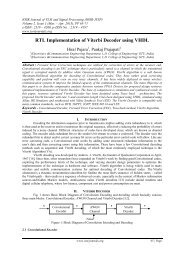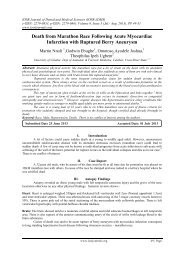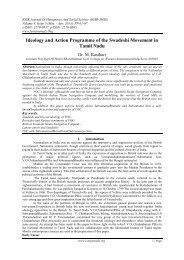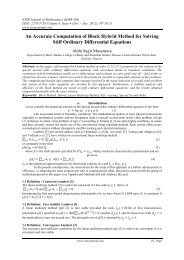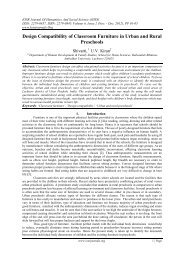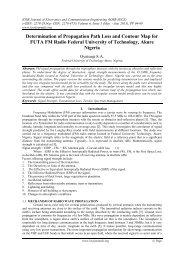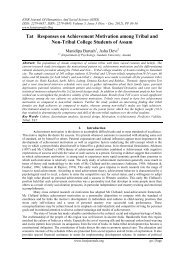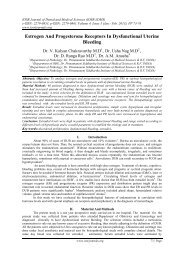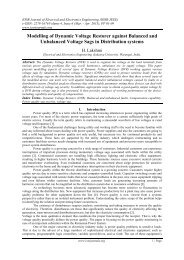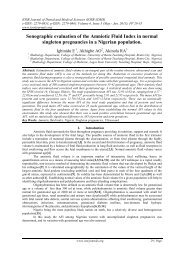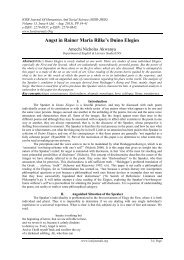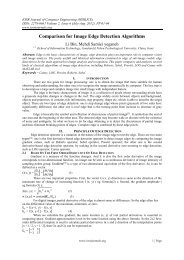Initial Conquest of India by Turks and Their Slaves - IOSR
Initial Conquest of India by Turks and Their Slaves - IOSR
Initial Conquest of India by Turks and Their Slaves - IOSR
Create successful ePaper yourself
Turn your PDF publications into a flip-book with our unique Google optimized e-Paper software.
Internal Conflicts <strong>and</strong> African Development: The Nigerian Experience<br />
difficulties in the effort to achieve stability <strong>and</strong> in nation building. There have also been conflicts <strong>of</strong> various<br />
dimensions in Nigeria; religious, political, ethnic, intra-communal, inter-community conflicts over l<strong>and</strong> <strong>and</strong><br />
natural resources, positions <strong>and</strong> representations, <strong>and</strong> more still, full scale intra-country civil war etc. We<br />
therefore hope that the result <strong>of</strong> Nigerian analysis will form a good analytic foundation for generalizing on the<br />
effect <strong>of</strong> internal conflicts in Africa <strong>and</strong> would lead us to resourceful conclusion.<br />
II. Problematizing Internal Conflicts in Nigeria<br />
In most recent years, there has been unimaginable rate <strong>of</strong> conflicts in Nigeria <strong>and</strong> the threat <strong>of</strong> others.<br />
In a study conducted in 2005, Elaigwu (2005) identified over one hundred <strong>and</strong> forty (140) recorded cases <strong>of</strong><br />
internal conflicts in Nigeria between 1980 <strong>and</strong> about June 2005, with over one hundred (100) <strong>of</strong> the cases<br />
coming up between 1999 <strong>and</strong> 2005 alone. People have been easily mobilized into confronting the other group<br />
<strong>and</strong> the workers, civil society <strong>and</strong> the students have also been easily mobilized to confront one set <strong>of</strong> people,<br />
policy, activity or the other. The process <strong>and</strong> plan towards achieving success in these confrontations have even<br />
taken upper position in the minds <strong>of</strong> the leaders instead <strong>of</strong> planning for national development. Positions <strong>of</strong><br />
political leaders <strong>of</strong> various groups in Nigeria <strong>and</strong> their preparedness to initiate or respond to conflicts even in<br />
both verbal (oral) confrontations justify the above position. Infact, this has been so widespread that you will<br />
hardly think <strong>of</strong> any region, ethnic group or organization that is not at anytime structuring its mind towards<br />
having an advantage over the other group or people <strong>and</strong> the other group poised at stopping them. As Oche<br />
(2000) explains, this situation has so much deteriorated to the extent that it has assumed the dimensions <strong>of</strong> a<br />
scourge. This position is underscored <strong>by</strong> the changing character, increased frequency <strong>and</strong> intensity as well as the<br />
deplorable implications <strong>and</strong> costs (Nwanegbo, 2006: 120).<br />
Looking at what happened during the Nigeria civil war <strong>and</strong> the devastation on the country; one would appreciate<br />
the enormity <strong>of</strong> the consequence <strong>of</strong> conflicts. In the early stage <strong>of</strong> the civil war, Oyediran (1979: 126) recorded<br />
that over 100,000 lives were lost. Prior to that, more than 50,000 persons have either lost their lives or had parts<br />
<strong>of</strong> their body maimed during the carnage in the North against the Igbo people in 1966.<br />
Another very devastating consequence <strong>of</strong> internal conflict is the problem <strong>of</strong> refugees on the host<br />
communities. The refugees create as much devastating effect to their host communities like the wars themselves<br />
do to those fighting. Instances can be seen in the Tiv-Jukun conflict, Zango-Kataf, Ife-Modake, Omasi-Igah, etc<br />
(Nwanegbo, 2005b). They were also quite devastating in effect <strong>and</strong> created insecurity for farming <strong>and</strong> other<br />
businesses (see Nnoli, 1998). It also happened in some other African countries; Somalia, (UN Report, 1993: 3-<br />
6), Rw<strong>and</strong>a, Liberia before the interference <strong>of</strong> ECOMOG in 1989, etc (Vogt & Amina, 1996 in Nwanegbo,<br />
2005: 5).<br />
Politics <strong>and</strong> ethno-religion are two most common areas <strong>of</strong> conflicts in Africa. Many also are linked up to group<br />
struggle for political leadership.<br />
If we take the geo-natural fact that African countries <strong>and</strong> precisely Nigeria is a country endowed with<br />
the quality <strong>of</strong> resources that could ordinarily, if well utilized, put the country into forefront <strong>of</strong> the world<br />
countries (See NEPAD-Full Text, 2003), we would underst<strong>and</strong> that something is basically wrong with the<br />
continent. Nigerian State has enormous resources in agriculture, in the economy, multi-pluralist democratic<br />
political advantage, <strong>and</strong> in personnel. But instead <strong>of</strong> these pulling her ahead, there has been series <strong>of</strong> distracting<br />
<strong>and</strong> disturbing conflicts, which ranged from full-scale war, riots, massacre, situation <strong>and</strong> preparation <strong>of</strong> wars.<br />
These scare away both national <strong>and</strong> foreign investments, leads to unending legal battles that keep resources<br />
engaged in unproductive exercises, loss <strong>of</strong> productive labour force, etc.<br />
Furthermore, with inter-group conflicts among African nations (for those that went out <strong>of</strong> proportion),<br />
the countries involved becomes detached from enhancing generic development in Africa. The African<br />
organizations established for the development purposes also turns concentration <strong>of</strong> efforts <strong>and</strong> resources to<br />
preventing, managing <strong>and</strong> resolving conflicts rather than carrying out the initial responsibility. Also other<br />
international organizations that dwell on third world development see humanitarian works <strong>of</strong> taking care <strong>of</strong><br />
refugees, providing welfare to war destitute, food, drugs, <strong>and</strong> resettlement etc, as primary needs <strong>of</strong> African<br />
countries (See UN Secretary General’s Report, 1998). While doing this, the basic efforts towards African<br />
development rather suffers. This is outside the destruction that is caused <strong>by</strong> wars <strong>and</strong> conflicts on existing<br />
structures <strong>and</strong> establishments.<br />
This work, commits itself to finding the place <strong>of</strong> these conflicts on the persistence <strong>and</strong> deepening <strong>of</strong><br />
poverty in Africa which most scholarly works have attempted to explain from different backgrounds <strong>and</strong> the<br />
which condition still seems intractable in Africa today. Though this study may not go into analyzing every<br />
conflict that took place in Africa in searching form the answer, but will make conscious effort to draw instances<br />
from specific cases in Nigeria, review it <strong>and</strong> use it to answer certain pertinent questions bothering on “whether<br />
high incidence <strong>of</strong> poverty account for persisting internal conflicts in Nigeria”? Secondly, to know “if low level<br />
<strong>of</strong> development is a consequence <strong>of</strong> persisting internal conflicts in Nigeria”?<br />
www.iosrjournals.org<br />
24 | Page



